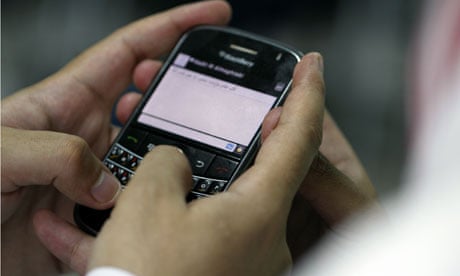You're in the middle of reading a long, important document, but suddenly find you can't concentrate. It's not because the topic is snore-inducing or because it's chocolate o'clock, but due to a tiny, red light, flashing insistently in the corner of your eye. A BlackBerry silently screaming for attention forces you to stop reading to see what the messagesays. Two minutes later, you do the same again.
Whether it's an iPhone or a trilling landline or a pinging email, the latest technology interrupts us all the time. But if you've ever wondered exactly what effect the myriad interruptions have on your working day, research by academics at the University of Kent is a worthy interruption.
The faculty of psychology at Kent set up a "reading laboratory" with an eyeball-tracking camera to monitor eye movements. It then linked up just over 100 testers and asked them to read a passage of text on a computer screen, before interrupting the participants with one-minute messages – like phone calls. They were then told to return to the original reading, while the eye-tracking camera analysed how they did so. The researchers, led by Ulrich Weger, a senior lecturer in psychology at Kent, found that participants re-read a substantial portion of text before reaching the point where they left the original task – so much so, that each interruption caused an average 17% increase in the total time it took to read the whole passage.
Weger was inspired to carry out the research by his own procrastination. "I noticed how easily I was distracted when working on my computer," he explains. "I wasted time by reading emails whenever they came into my inbox. I noticed that once I had started reading the name of the sender, I read the first line of the text. Once I mastered that, I continued reading the entire message, and once I got to that point, I felt compelled to respond because there was no point in leaving an already half-finished task. Then sometimes I needed extra information to answer the message, so had to add other tasks."
Weger says his many disruptions meant he "often wasn't making any progress with what I was originally working on – and in the end felt quite breathless and exhausted. I thought I couldn't be the only person struggling with this." Talking to colleagues confirmed the scale of the problem, and Weger secured funding from the Economic and Social Research Council to start investigating.
He believes the Kent research is important because our modern working environment is "full of tempting – and sometimes not so tempting – sources of interruptions", but admits it's tough to find ways to deal with them. "The best thing to do is to try and avoid interruptions in the first place – often people don't really need to respond to an interruption, but do so because it's tempting," he says.
Weger's research showed that simply leaving a mark on the page before responding to an interruption can allow you to resume reading much more efficiently afterwards, cutting 10% from the time it takes to return to the same point in the text. The academics also looked at the impact of background speech and music, and found that when participants were exposed to simultaneous background speech while reading a text, it took them significantly longer to get through it. Some workers might seize upon those findings as a reason to kill off open-plan offices.
But Weger says there will always be other distractions. He advises turning off attention-sappers such as automatic email notifications, and arranging desks so they don't point towards anything interesting – like people walking around outside, but admits: "Sometimes these strategies come with their own costs – turning off your iPod or mobile, for example, can trigger a yearning or even pressure that can get quite distracting in itself.
"The best way to overcome our addiction to new information is to learn to control yourself: you can do exercises to help ... using thought-control exercises like concentrating on a simple imagined object for a few minutes every day," he explains.
Weger says a concentration exercise he found in a book written by Rudolf Steiner 100 years ago is still useful. "As soon as you notice that you have diverted to another thought, pull yourself away from the intrusive thought and turn back to the image straight away. After practice, you get more competent at shielding yourself against the countless tempting stimuli in our world of information overload." It sounds very virtuous, but Weger admits he still gets lured into the trap of time-wasting procrastination – even while writing up his research into it. "I still struggle with distractions all the time," he says.
And as for BlackBerrys and their smartphone cousins, Weger says they're not all bad, and have a "mixed effect". He explains: "The upside of these devices is that you don't have to go home to get the information you need. But the downside is that if you allow yourself to become dependent, they will haunt you. As with all things: if you can make use of something that makes your life easier while maintaining enough inner strength and freedom to avoid dependence, you are the master. If you do not cultivate this inner strength and freedom, you become the slave."

Comments (…)
Sign in or create your Guardian account to join the discussion